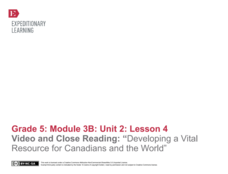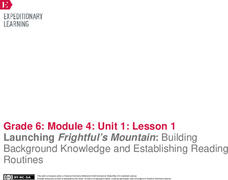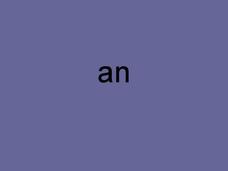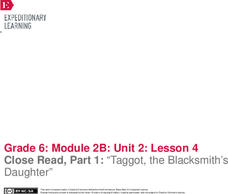Scholastic
Transitional Guided Reading
Use a fill-in-the-blank lesson plan template to enhance your guided reading lesson plans with details surrounding decoding strategies, fluency and phrasing, vocabulary strategies, comprehension, and more!
EngageNY
Video and Close Reading: “Developing a Vital Resource for Canadians and the World”
Scholars watch Developing a Vital Resource for Canadians and the World to learn about the supplement potash that helps plants grow. They watch the video several times, completing a note catcher to record key ideas along the way. Pupils...
Curated OER
Language Arts: Scavenger Word Hunt
Participate in a scavenger hunt to find objects beginning with a particular letter sound and take digital photos of them with your scholars. Using software, they find word pictures beginning with particular letters and locate picture...
Curated OER
Commonly Misspelled Words
Display this list of commonly misspelled and frequently confused words for your learners. Though there is no interactive component, this handout is a great reference tool comparing many homophones such as sole and soul. One tip...
Curated OER
Winning "The Voice": Cloze Exercise
This New York Times Learning Network exercise provides a cloze exercise along with a word bank that readers can use to complete the passage about the television show, "The Voice" and Jermaine Paul, a recent winner. Another option is to...
EngageNY
Launching Frightful’s Mountain: Building Background Knowledge and Establishing Reading Routines
Welcome to Frightful's Mountain. The teacher introduces scholars to the text Frightful’s Mountain by reading the first chapter aloud. Learners then talk with a partner about the text. The instructor models answering focus questions as...
McGraw Hill
Determine the Meaning of Words and Phrases
Work on using context clues in your social studies class. Pupils read a brief selection about the terrain in Senegal and define each of the underlined words in the space provided. They also list the context clues that helped them...
Curated OER
Camera Words
In this sight words list activity, students pronounce, review and analyze thirty six sight words to combine them into as many coherent sentences as possible. Students share their sentences with each other.
Curated OER
Find a Small Word Inside a Bigger Word 2
In this recognizing smaller words hiding inside bigger words worksheet, students read lists of words and underline the small word inside each one. Students underline 20 words.
Curated OER
Phase 3: Sight Words
Use this list of 25 high frequency words to boost sight word recognition, as a spelling list, or as a quiz. These are very simple words that are 2-4 letters in length.
Curated OER
Sight Words
Have your class practice the Dolch sight words using this presentation. Words appear one at a time on a plain white background. While just a list of fifty words, this resource could be very useful as a review tool.
Curated OER
Sight Words
Practice sight words. There is a list of forty-six words, such as house, very, and half. Learners could use this resource to practice reading or spelling these words. It would also work well as part of a whole group or center activity.
Curated OER
Word List
High-frequency words can be used to construct simple phrases. Each of the 99 slides contains a 2-3 word phrase constructed using basic sight words. Could be used for early elementary or ESL.
K12 Reader
Find the Same Word
Assess the spelling skills of your beginning readers with a simple worksheet. Looking at a list of five CVC words, children must correctly match each one to another word with exactly the same spelling. An easy way to monitor young...
Curated OER
Sight Words
Forty-five different words are listed in this vibrant PowerPoint. Review this presentation daily to kick-off your language arts lessons. Each word is presented on its own slide against a colorful background.
Novelinks
The Tempest: List-Group-Label (After Reading)
Collaborate with your class after reading William Shakespeare's The Tempest with a group labeling activity. As you note key concepts or words from the play on the board, class members suggest associations and connections to each one, and...
Meadows Center for Preventing Educational Risk, University of Texas at Austin
Lesson 10 - Compound Words
Individually, words have power, but when added together, they can take on a whole other level of meaning. Readers learn about compound words in the 10th of 17 lessons of the Word Recognition and Fluency series. A script provides guidance...
Curated OER
The Catcher in the Rye: List-Group-Label Activity
Here's a list-group-label vocabulary activity for The Catcher in the Rye that will knock readers out, it really will! Groups sort, label, and define a list of words taken from Salinger’s novel. Complete directions for the activity, the...
EngageNY
Reading for Gist, Answering Text-Dependent Questions, and Determining Author’s Purpose: Industrial Food Chain
A Reading Closely: Guiding Questions handout leads readers to discover the gist of The Omnivore’s Dilemma. While reading, pupils look closely at the words in the text and discuss their meaning. They use dictionaries when needed to answer...
EngageNY
Reading and Writing About How to Perform a Process: How Meg Lowman Studies the Rainforest (Pages 4–8)
It's a process. Scholars read to understand the process Meg Lowman uses for pressing specimens. Learners work in groups to define vocabulary and create a list of the steps used. They then carry out the steps using provided materials.
EngageNY
Reading for Gist and Answering Text-Dependent Questions: Local Sustainable Food Chain
Readers use sticky notes and a Reading Closely: Guiding Questions handout to record the gist of a different section (pages 161-166) in The Omnivore’s Dilemma. They then pair up and share their ideas. To end the lesson, readers complete...
EngageNY
Close Reading: “Dog Sleds” and “Kayak”
Visualize it! Scholars read pages 12–15 of The Inuit Thought of It and create a visual gist of the text. They then do a close read of the text and create a natural environment anchor chart before answering text-dependent questions.
EngageNY
Close Read, Part 1: “Taggot, the Blacksmith’s Daughter”
There would be no luck if it were not for bad luck. Scholars take a close look at the theme of adversity through multiple reads of Taggot, the Blacksmith’s Daughter. They place sticky notes on important details of the story and complete...
EngageNY
Independent Reading: Final Product
Cheater! Scholars create independent reading cheat sheets to help others learn about a book. They rate the book, list quotes, and describe how they connected to the text. Readers share their cheat sheets with others and conduct a gallery...

























